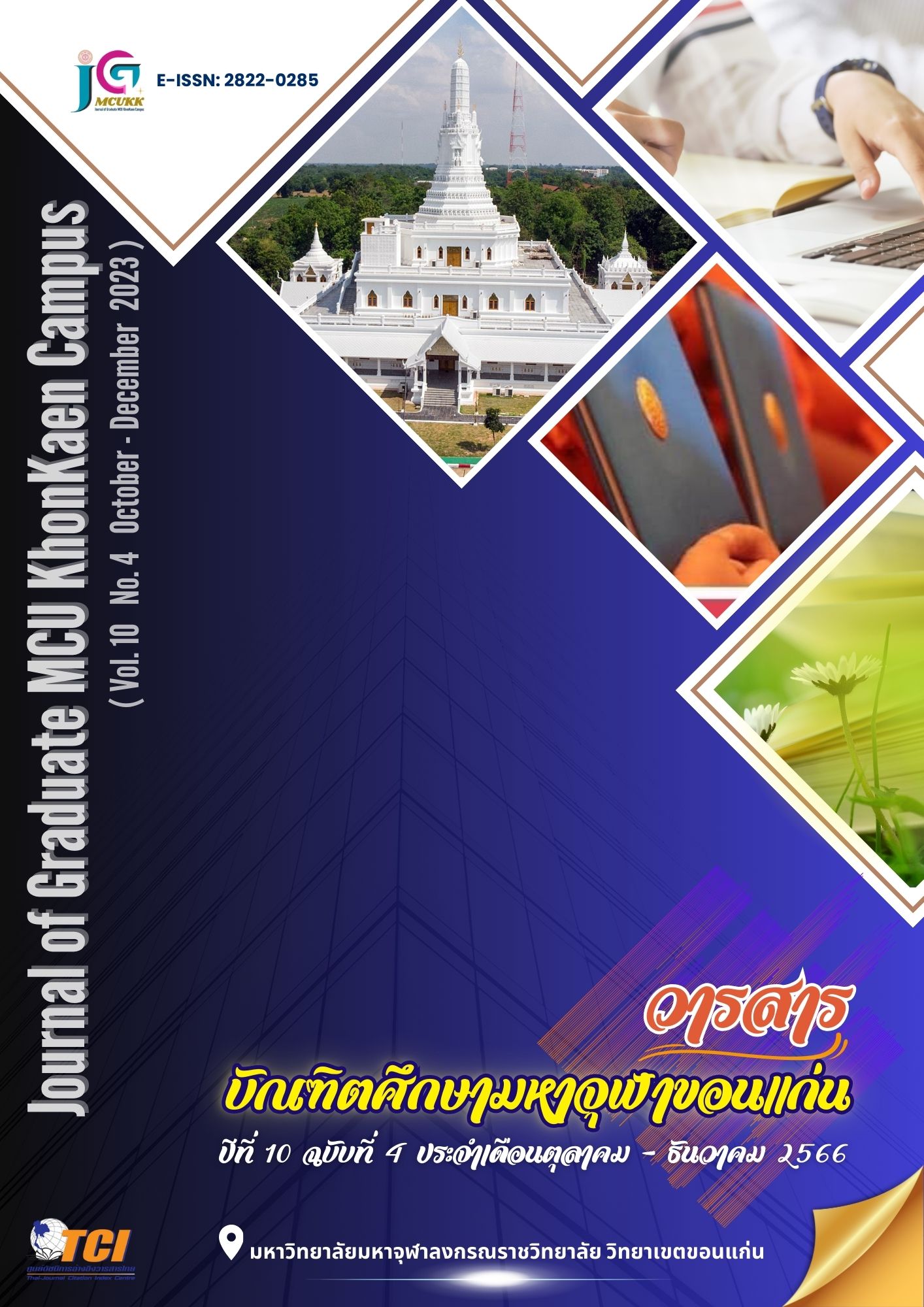การมีส่วนร่วมของผู้นำท้องถิ่นในการส่งเสริมการปกครองคณะสงฆ์ อำเภอโกสุมพิสัย จังหวัดมหาสารคาม
Main Article Content
บทคัดย่อ
การวิจัยครั้งนี้มีวัตถุประสงค์เพื่อ 1) ศึกษาระดับการมีส่วนร่วมของผู้นำท้องถิ่นในการส่งเสริมการปกครองคณะสงฆ์อำเภอโกสุมพิสัย จังหวัดมหาสารคาม 2) เปรียบเทียบระดับการมีส่วนร่วมของผู้นำท้องถิ่นในการส่งเสริมการปกครองคณะสงฆ์อำเภอโกสุมพิสัย จังหวัดมหาสารคาม 3) ศึกษาข้อเสนอแนะการมีส่วนร่วมของผู้นำท้องถิ่นในการส่งเสริมการปกครองคณะสงฆ์ ประยุกต์ตามหลักอิทธิบาท 4 เป็นการวิจัยแบบผสานวิธีกลุ่มตัวอย่าง จำนวน 231 รูป/คน และผู้ให้ข้อมูลสำคัญ จำนวน 12 รูป/คน เครื่องมือที่ใช้เป็น แบบสอบถาม และแบบสัมภาษณ์ ทำการวิเคราะห์ข้อมูลโดยใช้โปรแกรมสำเร็จรูปทางสังคมศาสตร์ และวิเคราะห์เนื้อหาประกอบบริบท
ผลการวิจัยพบว่า
1. การมีส่วนร่วมของผู้นำท้องถิ่นในการส่งเสริมการปกครองคณะสงฆ์อำเภอโกสุมพิสัย จังหวัดมหาสารคาม ทั้ง 6 ด้าน โดยภาพรวมอยู่ในระดับมาก ค่าเฉลี่ยเท่ากับ 3.74 เมื่อพิจารณาเป็นรายด้าน พบว่า อยู่ในระดับมากทุกด้าน เรียงค่าเฉลี่ยจากมากไปหาน้อย พบว่า ด้านการปกครองมีค่าเฉลี่ยสูงสุด เท่ากับ 3.93 รองลงมาได้แก่ ด้านการศึกษา ด้านการเผยแผ่ ด้านการศึกษาสงเคราะห์ ด้านสาธารณูปการและ ด้านการสาธารณะสงเคราะห์ ค่าเฉลี่ยเท่ากับ 3.79, 3.77, 3.69, 3.69 และ 3.68 ตามลำดับ
2. ผลการเปรียบเทียบการมีส่วนร่วมของผู้นำท้องถิ่นในการส่งเสริมการปกครองคณะสงฆ์ พบว่าผู้นำท้องถิ่นที่มีตำแหน่งต่างกัน มีส่วนร่วมในการส่งเสริมการปกครองคณะสงฆ์ แตกต่างกัน อย่างมีนัยสำคัญทางสถิติที่ระดับ 0.05 และผู้นำท้องถิ่นที่มีเพศ อายุ การศึกษาต่างกัน มีส่วนร่วมในการส่งเสริมการปกครองคณะสงฆ์ ไม่แตกต่างกัน
3. ข้อเสนอแนะ การมีส่วนร่วมของผู้นำท้องถิ่นในการส่งเสริมการปกครองคณะสงฆ์ ประยุกต์ตามหลักอิทธิบาท 4 พบว่า ด้านการปกครอง ควรส่งเสริมคณะสงฆ์ปฏิบัติต่อพระธรรมวินัย กฎหมาย ระเบียบของมหาเถรสมาคม ด้านการศึกษา คณะสงฆ์ควรมีบทบาทสำคัญในการส่งเสริมการศึกษาของเยาวชนและประชาชน ด้านการเผยแผ่ ควรมีการวางแผน เตรียมการและการจัดการให้การเผยแผ่ศาสนาด้านการศึกษาสงเคราะห์ ควรสงเคราะห์การจัดการศึกษา เพื่อให้สังคมเห็นคุณค่าการจัดการศึกษาทั้งทางคดีโลกและคดีธรรมมากขึ้น ด้านการสาธารณสงเคราะห์ ควรส่งเสริมคณะสงฆ์ให้ความรู้ด้านความช่วยเหลือสังคมมากยิ่งขึ้น ด้านสาธารณูปการ ควรปรับปรุง ภูมิทัศน์ บริเวณวัด ให้มีความร่มรื่น สะอาด
Article Details

อนุญาตภายใต้เงื่อนไข Creative Commons Attribution-NonCommercial-NoDerivatives 4.0 International License.
เอกสารอ้างอิง
ณัชชา มูลยาพอ, สมเดช นามเกตุ และ สุวิทย์ ขาวนอก. (2548). การศึกษาการมีส่วนร่วมของพระสงฆ์ในกิจการการพัฒนาองค์การบริหารส่วนตำบลในจังหวัดหนองคายและอุดรธานี. (รายงานการวิจัย). หนองคาย: มหาวิทยาลัยมหาจุฬาลงกรณราชวิทยาลัย วิทยาเขตหนองคาย.
พระครูนิมิตสาธุวัฒน์ (บุญเมือง ชวโน), สมเดช นามเกตุ และ บุญส่ง สินธุ์นอก. (2564). แนวทางการบริหารกิจการคณะสงฆ์ด้วยหลักสังคหวัตถุของพระสังฆาธิการในเขตปกครองอำเภอหนองแสง จังหวัดอุดรธานี. Journal of Modern Learning Development, 6(3), 44-57.
พระมหาสุริยา ฐิตเมธี (โฮมจุมจัง) และ พัชรี ศิลารัตน์. (2560). ความคิดเห็นของประชาชนที่มีต่อบทบาท ของพระสงฆ์ต่อการพัฒนาท้องถิ่นในเขตเทศบาลตำบลร่องคำ อำเภอร่องคำ จังหวัดกาฬสินธุ์. วารสารการศึกษาและการพัฒนาสังคม, 13(1), 276-290.
พระวสันต์ วสนฺตเวที (หงอกชัย) และ ชาญชัย ฮวดศรี. (2564). การมีส่วนร่วมของผู้นำท้องถิ่นในการส่งเสริมการปกครองคณะสงฆ์อำเภอเมือง จังหวัดขอนแก่น. Journal of Buddhist Education and Research : JBER, 7(1), 71-82.
พระศรัณย์วุฒิ ป.ปญฺญาพหุโล (จินดาไพสิฐ), พระมหากฤษฎา กิตฺติโสภโณ และ ธิติวุฒิ หมั่นมี. (2562). บทบาทการปกครองคณะสงฆ์ของพระสังฆาธิการในอำเภอเดิมบางนางบวช จังหวัดสุพรรณบุรี. วารสารการบริหารการปกครองและนวัตกรรมท้องถิ่น, 3(1), 33-44.
วีรนุช พรมจักร และ ณฐภัทร อยู่เมือง. (2562). การส่งเสริมบทบาทพระสงฆ์ในการเผยแผ่พระพุทธศาสนา โดยใช้หลักการเข้าใจ เข้าถึง และพัฒนาในจังหวัดนครปฐม ยโสธร สุราษฎร์ธานี และเชียงใหม่. (โครงการวิจัย) 3.
วีระยุทธ ยะสาย. (2561). บทบาทพระสังฆาธิการในการบริหารกิจการคณะสงฆ์ อำเภอบางปะอิน จังหวัดพระนครศรีอยุธยา. วารสารครุศาสตร์ปริทรรศน์ฯ, 5(2), 63-73.

